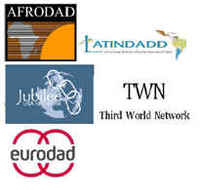International civil organizations claim for a lasting solution to sovereign debt
Eurodad, Afrodad, Latindadd, Jubilee USA and the Third World Network (TWN) joined hands to call in a joint statement for a lasting solution to the sovereign debt crisis and the establishment of a fair and independent international debt workout mechanism.
Following the global financial crisis, low-, middle- and high-income countries are seeing increased levels of sovereign debt. Today no international mechanism exists to deal comprehensively and effectively with sovereign debt problems, according to the evaluation of the signing organizations.
Countries all over the world are becoming increasingly vulnerable to sovereign debt problems following the financial crisis, they warn. This looming debt crisis and the failure to deal efficiently with the current and past crises have triggered debates on how to ensure fair and predictable debt workout in the future.
The current debt crisis within the Eurozone illustrates once again that a predictable, efficient, independent and fair procedure is needed, and that once a crisis hits it is too late to define a fast and fair way out, the organizations said in their statement.
The Eurozone crisis is also a reminder that debt and the way sovereign debt is dealt with is a highly political issue which can have enormous social and political consequences if not dealt with in an efficient way, including holding lenders to account for reckless lending and speculation, remarked the institutions.
The joint statement reads as follows:
Towards a lasting solution to sovereign debt problems
Following the global financial crisis, low-, middle- and high-income countries are seeing increased levels of sovereign debt. Today no international mechanism exists to deal comprehensively and effectively with sovereign debt problems. A lasting solution requires an independent debt workout mechanism.
A looming debt crisis
Countries all over the world are becoming increasingly vulnerable to sovereign debt problems following the financial crisis:
▪ Almost one third of all low-income countries (LICs) are in debt distress or at high risk of debt distress. Another third is at moderate risk of debt distress;
▪ One quarter of countries that have benefited from substantial debt relief during the last decade are again at high risk of debt distress;
▪ The foreign debt payments for impoverished countries will increase by one-third over the next few years.
This looming debt crisis and the failure to deal efficiently with the current and past crises have triggered debates on how to ensure fair and predictable debt workout in the future.
The current debt crisis within the Eurozone illustrates once again that a predictable, efficient, independent and fair procedure is needed, and that once a crisis hits it is too late to define a fast and fair way out. The Eurozone crisis is also a reminder that debt and the way sovereign debt is dealt with is a highly political issue which can have enormous social and political consequences if not dealt with in an efficient way, including holding lenders to account for reckless lending and speculation.
Why current mechanisms are not up to the mark Current debt relief procedures were not intended to deal with today’s complex debt structures. The Heavily Indebted Poor Countries (HIPC) Initiative is coming to an end, and existing mechanisms do not reflect the actual debt situation of developing countries. Ad hoc procedures exist for bilateral debt to a few countries, and for some bondholders, however these creditors hold only a minor part of developing countries’ debt.
While debt relief has freed up valuable resources in a number of developing countries, the mechanisms through which debt relief has been granted have serious shortfalls that prevent lasting solutions.
Some major shortfalls of current mechanisms are:
▪ They are dominated by creditors who are also affected parties. This creates a conflict of interest, undermines impartiality and sometimes results in politically biased decisions, including harmful policy conditionality;
▪ They are ad hoc, which means that the process as well as the outcome is highly unpredictable. This lengthens the resolution process,making it more costly for both creditors and debtors;
▪ They are creditor specific, hence they fail to assess the full debt burden of the country in question and some creditors are left out when a solution is negotiated;
▪ All too often, they only make financial considerations when assessing how much debt a country can continue servicing, and fail to take development needs into account;
▪ Last but not least, because of the lack of a formal procedure that ensures fair burden-sharing between creditors and debtors and assesses the validity of claims, current procedures fail to discipline lenders and prevent them from irresponsible lending in the future.
These shortfalls illustrate that lending to and borrowing by sovereign states and the resolution of any quantitative or qualitative debt problems are a political issue as much as a technical one.
A fair solution to sovereign debt problems requires an international mechanism that:
▪ Is independent of creditors in analysis and decision making, and is situated in a neutral forum;
▪ Is comprehensive: Includes bilateral, multilateral and private creditors treating all foreign creditors on an equal basis, and is available to all sovereign states who are at risk of debt distress or claim that their debts are illegitimate;
▪ Provides a human needs based approach to debt sustainability: When assessing a government’s capacity to service its debt, takes into account the financial resources needed by a government to fulfil its obligations to provide essential services for its population;
▪ Holds lenders and borrowers to account for irresponsible behaviour by auditing the legitimacy of claims and demanding the cancellation of unjust debts based on corrupt, irresponsible or undemocratically contracted loans which did not benefit the people of the borrowing country;
▪ Gives all stakeholders, including civil society, the right to be heard and give evidence.
Commentaires
%login_link_starAuthentifiez vous ou créez un nouveau compte utilisateur pour commenter.

